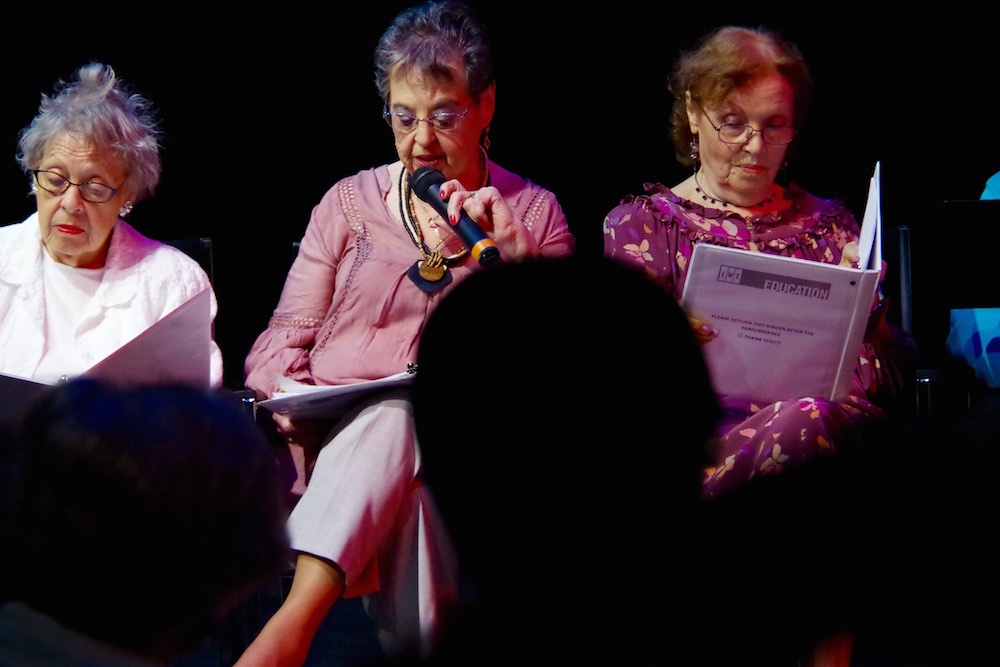
Abduladhim Al-Ani, with Vivian Smith and Herb Mermelstein. Lucy Gellman photos.
Long Wharf Theatre may have found its best actors, and they happen to come from an assisted living community just down the street.
They have memorized their lines and taken their places. Bottles of water, cushy chairs and microphones sit out for those who need them. They’re just not a traditional cast and crew.
They are part of the ElderPlay Project, a collaboration between Long Wharf educators and residents at Tower One Tower East senior living facility. Sunday afternoon, they gathered at Long Wharf’s Stage II to perform Live Every Moment, Love Every Day, the culmination of a year of writing and reflection. An encore performance in the Tower One Dining Room is planned for Sept. 14.
Now in its seventh year, the project funds a small group of Towers seniors as they attend each performance in Long Wharf’s season and work with Education Director Madelyn Ardito to craft long, personal responses to the works.
This year’s full troupe included Abduladhim Al-Ani, Terry Berger, Ellen DuBoff, MaryAnn Ettinger, Elaine Feldman, Lois Itchkawitz, Bertha Kahn, Ruth Maxim, Barbara McDonnell, Arlene Meckler, Herb Mermelstein, and Vivian Smith.
As seniors met for a formal class twice for each show, Ardito encouraged them to write down their reactions, cataloguing them in a sort of reflective journal. At the end of the year, she and Education Programs Manager Eliza Orleans combed through those journals, turning them into an hour-long ensemble piece that ElderPlay members could read.
“We had a lot of really fantastic conversations, debates, cries, laughs,” said Ardito before the performance Sunday.

Terry Berger, Elaine Feldman (on mic) and a reader for Ruth Maxim.
The season has not been an easy storm to weather. Stirring fall and winter performances of Jerry Sterner’s Other People’s Money and Samuel Beckett’s Endgame came in strong, leaving big and exciting existential questions in their wake. On the cusp of spring, Lydia Diamond’s Smart People paired a potent and timely script with actors who tried to out-act themselves, sometimes to the detriment of the show.
But three young works scattered throughout — Napoli, Brooklyn, and the premieres of Meteor Shower and The Most Beautiful Room in New York — left perfectly talented actors stumbling around the stage as half-baked caricatures of themselves, their mouths filled with dialogue that was stale, predictable, and cumbersome.
Tasked with containing it, members of the ElderPlay Project rose to the challenge, using personal anecdote and years of experience to dig extremely deep. From the performance's first (and blessedly short) mention of Meteor Shower to the last of The Most Beautiful Room, seniors concentrate on not the literal works, but the innermost existential questions they raise. Who have I become? What is it to love and lose?
Why am I here? Why are any of us here?
The result, by leaps and bounds, is the most humane, intimate and authentic piece Long Wharf has mounted all year. When, in the throes of passion, ElderPlay veteran Terry Berger describes her decision to take a yellow cab uptown and declare her love to an art dealer with a single, bright red rose (in the midst of her own divorce, no less), we wait for the result with bated breath. When she returns with the first-time confession of an abortion in 1958 — 15 years before the Supreme Court’s passage of Roe V. Wade — whole histories resurface and unravel, pulling at the test of time with their long fingers.
Then there is Arlene Meckler, who always wanted to be an actress, but ultimately settled into a career as a math teacher, and found in her chalkboard and lesson plans the same grace she had wanted from the stage. Or Vivian Smith, who dumped a longtime friend after hearing her make a racist remark about local burglaries.
Bertha Kahn, who immigrated from Germany at age 13, and watched her mother request “curtains for her face” after the veil on her hat had ripped, and she had to go to the milliner for the first time in a new country.
Or Herb Mermelstein, who watched his son succumb to cancer. When Mermelstein announces in a level, low voice to the audience that “he is now with his mother,” there is nothing you can do to keep yourself together anymore. The weight of a father’s grief, only outdone by that of his love, comes crashing down.
Their histories come tumbling forth, and with them the urge to listen, to preserve, to learn from these wise voices before it has become too late. September’s encore performance should be billed as a must-see: these aren’t cute old people taking a stab at theater, but community elders with deep and complex thoughts on what it means to live a life and leave a legacy.
Despite its success, the project is facing an uncertain future. Arts funding that supported it has been slashed, placing it in immediate jeopardy for the next year. An individual donor has stepped forward to fill some of that gap, but ElderPlay’s sustainability remained unclear as of last week.
That might just be the way things go, said ElderPlay members in unison at the end of the show. Reading from their scripts, they looked up at the audience, eyes glinting in the theater’s bright light.
"C’est la vie," they said. "It’s life. Change is the only constant."